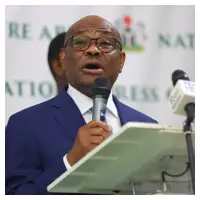Former Jigawa State Governor, Sule Lamido, has revealed that he boldly advised former Nigerian military President Ibrahim Babangida (IBB) to "resign and leave office" following the controversial annulment of the June 12, 1993 presidential election won by Moshood Kashimawo Abiola.
The revelation comes from Lamido's newly released 487-page autobiography titled 'Being True to Myself,' which was unveiled in Abuja on Tuesday.
According to excerpts from the book, Lamido recounted his frank conversation with IBB during their first meeting. "In my discussion with Babangida, being the first time we met, he found me genuine, with no pretensions, and even maybe naive," Lamido wrote.
"Then he asked me, 'Sule, what do I do?' In my naive and innocent way, I told him frankly, 'Sir, you must resign and leave office.'"
Lamido noted that his blunt response visibly shocked the military leader. "Immediately I said that his countenance changed. I saw fire in his eyes; for some minutes he was speechless," he revealed.
The former governor also disclosed that he was satisfied with the formation of an interim government only because it would lead to IBB's exit from power. Additionally, he explained that the choice of former President Olusegun Obasanjo as the presidential candidate of the Peoples Democratic Party (PDP) in 1999 was strategically made "to heal the June 12 wound."
The book launch attracted numerous high-profile dignitaries. President Bola Tinubu was represented by Minister of Information and National Orientation, Idris Mohammed. Other notable attendees included former President Olusegun Obasanjo, former Head of State General Abdulsalami Abubakar (rtd), and former Independent National Electoral Commission (INEC) Chairman Professor Attahiru Jega.
Former Senate President Iyorchia Ayu served as the book reviewer, while former Vice President Atiku Abubakar and Labour Party's 2023 presidential candidate Peter Obi participated in launching the book.
The autobiography provides rare insights into Nigeria's political history, particularly the tumultuous period following the annulment of the June 12 election, which is widely regarded as one of the most significant political crises in Nigeria's democratic journey.













